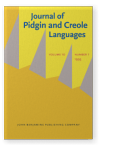Vol. 10:1 (1995) ► pp.77–126
The Origins of Lesser Antillean French Creole
Some Literary and Lexical Evidence
A survey of literary and lexical evidence — early French descriptions of Martinique and its neighboring islands, and the etymologies of modern Dominican names for fish and parts of dugout canoes — suggests that Lesser Antillean French Creole did not take shape until the first decades of the 18th century, some 70 years after French colonization got seriously underway in 1635. The language's progenitors included a Spanish-Carib-French pidgin used between French settlers, their African slaves, and the islands' aboriginal inhabitants; a simplified form of French; and Standard French. No African influences are attested before the 1690s.
Cited by (2)
Cited by 2 other publications
This list is based on CrossRef data as of 5 july 2024. Please note that it may not be complete. Sources presented here have been supplied by the respective publishers. Any errors therein should be reported to them.
